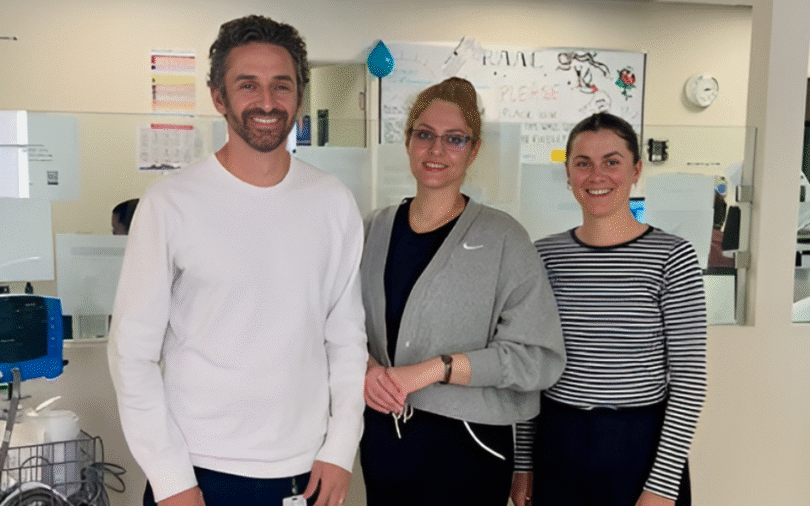Every day in British Columbia, five people lose their lives to unregulated drug toxicity. It is a crisis that demands new solutions.
April 14, 2025 marked the ninth anniversary of BC declaring the toxic drug crisis a public health emergency. Thousands have passed away from drug poisoning in the last nine years. Thousands more — including their family and friends — continue to suffer.
Communities across the province are working urgently to address the devastating impacts. In Vancouver, Dr. Paxton Bach is partnering with people with substance use disorders to improve treatment options and create new pathways to recovery.
As an addiction medicine specialist at St. Paul’s Hospital, Paxton has seen firsthand the complex health challenges linked to stimulant drugs like crystal methamphetamine (“crystal meth”). The rise in stimulant use has led to more chronic diseases, emergency room visits, hospitalizations, and overdose deaths.
Paxton says the use of both opioids and stimulants is a growing concern in the overdose crisis.
“While fentanyl and other opioids are the primary drivers of rising overdose deaths, up to 80% of overdose deaths in BC also involve stimulants,” he says. “Yet the role of stimulants gets little attention — and treatment options are limited.”
Paxton is leading research to explore new treatments for people living with methamphetamine use disorder — offering hope for better health and stronger support systems.
He is supported by Michael Smith Health Research BC through a Health Professional-Investigator (HP-I) award, in partnership with the BC Centre on Substance Use and St. Paul’s Foundation.
The HP-I award enabled Paxton to focus his research on how people use methamphetamines and the effects on their health, relationships, and daily lives. Understanding this will help determine the most effective treatments.
His findings are helping decision-makers better understand the issue to consider more effective solutions. He has shared his research insights with Health Canada’s expert advisory group on safer supply, which advises the federal government on preventing stimulant-related harms. He also sits on the BC Coroners Service’s drug toxicity death review panel, which provides recommendations to the provincial government about interventions to prevent overdose deaths.
The HP-I award helped Paxton’s team lay the foundation for a national clinical trial on treating methamphetamine use disorder and secure $5 million from the Canadian Institutes of Health Research. The trial is looking at the impacts of using medication alone and in combination with a behavioral intervention.
Colin Johnson, co-chair of the Toronto Harm Reduction Alliance, sits on the national research committee guiding the clinical trial. He says there’s a significant lack of research in this area, making the study an essential part of finding solutions.
Colin is a strong advocate for research that meaningfully involves the communities it impacts — and returns value to them. He and other peers with lived and living experience helped design the trial, ensuring research questions reflect the needs of the people most affected.
“There’s a lot of research that investigates a topic without asking affected communities what they would like to have researched,” says Colin. “And then when you get to what was found, it benefits no one. Because the questions that researchers are asking do not answer the questions that people want answered.”
He adds that stigma can lead to silence.
“People who use drugs have been treated so negatively by society that after awhile, they don’t even bother trying to say anything because they’re dismissed,” says Colin. “It’s critical that they be heard. I want to ensure their voices count.”
The clinical trial is being carried out at five sites across Canada, including Vancouver, and is the largest study on methamphetamine use disorder. Its findings will impact patients, clinicians, and policymakers — guiding responses to the ongoing overdose crisis and helping to shape future treatment guidelines across the country and beyond.
“It’s crucial to recognize the role of stimulants in the drug crisis — and to develop real solutions for this highly vulnerable and underserved community,” says Paxton.
Dr. Paxton Bach is Co-Medical Director at the BC Centre on Substance Use and Clinical Assistant Professor in the Department of Medicine in the Faculty of Medicine at the University of British Columbia.
The Vancouver site is currently enrolling participants into the clinical trial. People from the Lower Mainland aged 18-55 with moderate to severe methamphetamine use disorder may be eligible for the study. For more information, view the study poster.
This story was originally published on the Health Research BC website.





